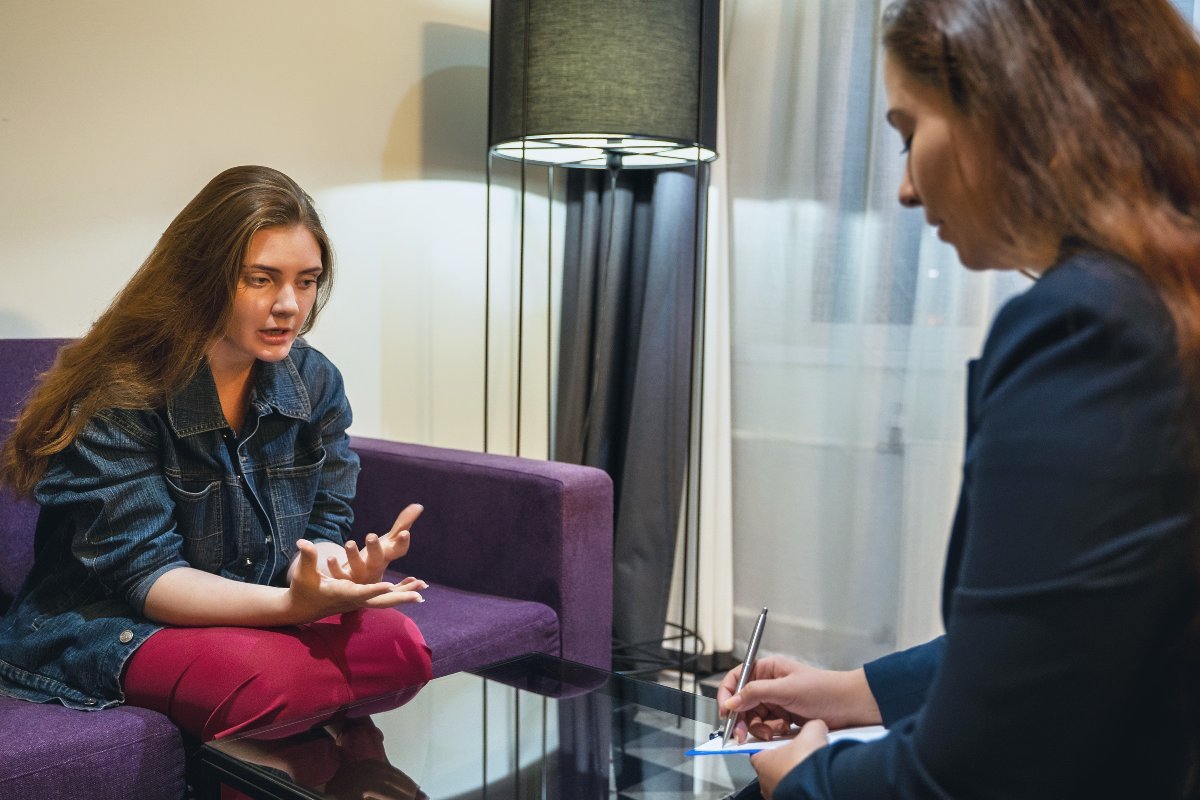
Education Center
What is CBT Most Commonly Used For?
Cognitive behavioral therapy is commonly used to treat anxiety, depression, and other mental health disorders. Here is a more comprehensive list of conditions treated with CBT:
Learn more about different mental health disorders in our Education Center.
Does Cognitive Behavioral Therapy Work?
Many research studies have found that CBT works on a variety of mental health conditions. A major meta-analysis review looked at over a hundred CBT studies. The review concluded there is strong evidence that cognitive behavioral therapy is effective for a range of mental health conditions, especially when used to treat anxiety disorders.
The authors of the review noted that CBT alone was not as effective for certain conditions, such as depression and bipolar. However, CBT can still improve quality of life when used with psychiatric medication. For most mental health conditions, there is no one treatment that can completely manage symptoms. Usually, it’s necessary to combine several treatment methods.

Types of CBT
Although cognitive behavioral therapy is an effective approach on its own, there are many different types of CBT-based therapies. These include:
Each of these types of CBT are used for particular issues. For example, moral reconation therapy is designed to help people examine the moral consequences of their actions, and it is often used for substance abuse treatment. Dialectical behavior therapy was developed to treat borderline personality disorder but is now used for a range of other disorders.
What is CBT Like?
Cognitive Behavioral Therapy Techniques
There are a wide variety of techniques therapists use when practicing cognitive behavioral therapy. Each of them serves a specific purpose in modifying your thoughts and behaviors. Here are a few of the most popular CBT techniques.
Thought Records
You can’t change negative thought patterns if you’re unaware of them. The term “thought records” refers to the process of writing down your thoughts over time, especially when negative emotions come up. Your therapist may ask you to keep a journal or they may provide you with worksheets to use. Thought records allow you to look back and reflect on your thought patterns, then objectively examine the truth about these thoughts.
Cognitive Restructuring
Once you have an idea of your negative thought patterns, you can use cognitive restructuring to replace them with more realistic and positive thoughts. For example, if you often think, “I’m a bad parent because I lose my temper with my kids,” you could modify that thought to something along the lines of, “I sometimes become unreasonably angry at my kids, but I still love them and try to be a good parent.”
Behavioral Activation
Although our thoughts greatly impact our feelings, our behaviors also have the ability to impact our mood. Behavioral activation takes advantage of this principle. It involves scheduling activities throughout the week so that you’re more likely to follow through with them.
Depending on what particular mental health issue you’re struggling with, behavioral activation may center on different types of activities. For example, if you have depression and find it hard to enjoy your favorite activities, your therapist might ask you to schedule some time to engage in a hobby or chat with a close friend.
Behavioral Experiments
Behavioral experiments involve predicting what will happen in a certain situation and then comparing your prediction to the actual outcome. This technique can be very helpful because it shows you how many times your brain may get it wrong, and how you tend to distort potential outcomes.
For example, if you predict you’ll trip over your words throughout a job interview but end up only stuttering once, you can see that your thoughts are an exaggeration. This evidence helps you form more realistic predictions for the future.

How Long Does It Take for CBT to Work?
Although each person’s circumstances are unique, cognitive behavioral therapy generally starts to improve symptoms within a few sessions, and treatment typically lasts at least 12 weeks. Brief cognitive behavioral therapy (BCBT) is designed to work more rapidly, typically lasting four to eight sessions (PDF).
It’s important to keep in mind that some mental health conditions require long-term maintenance. You may regularly attend therapy for months or even years.
How Much Does Cognitive Behavioral Therapy Cost?
The cost of cognitive behavioral therapy ranges from under $100 to over $200 per session. Cost varies by geographic location, the expertise of the individual practitioner, and insurance coverage. Financial assistance is available in some cases. For example, some community clinics offer free services for those who qualify. Therapists may also offer services on a sliding scale based on income.
Does Insurance Cover CBT?
Many insurance plans offer comprehensive coverage for mental health services, including cognitive behavioral therapy. However, you should always contact your insurance provider to ask what is covered and see if there are any coverage limits or deductibles. Also keep in mind that a formal diagnosis may be required for insurance coverage.
Do I Need Cognitive Behavioral Therapy?
You may need cognitive behavioral therapy if:
Because CBT is results-focused, it can be very helpful for managing a mental health disorder. Even if you already take medication, you could still benefit from therapy to address some of the underlying thought patterns that contribute to your symptoms.
Our staff utilizes this highly effective form of therapy, along with other methods. We treat all psychiatric disorders and substance use disorders. If you or a loved one would like to try cognitive behavioral therapy, get in touch with High Focus Centers or call us at (800) 877-3628.


